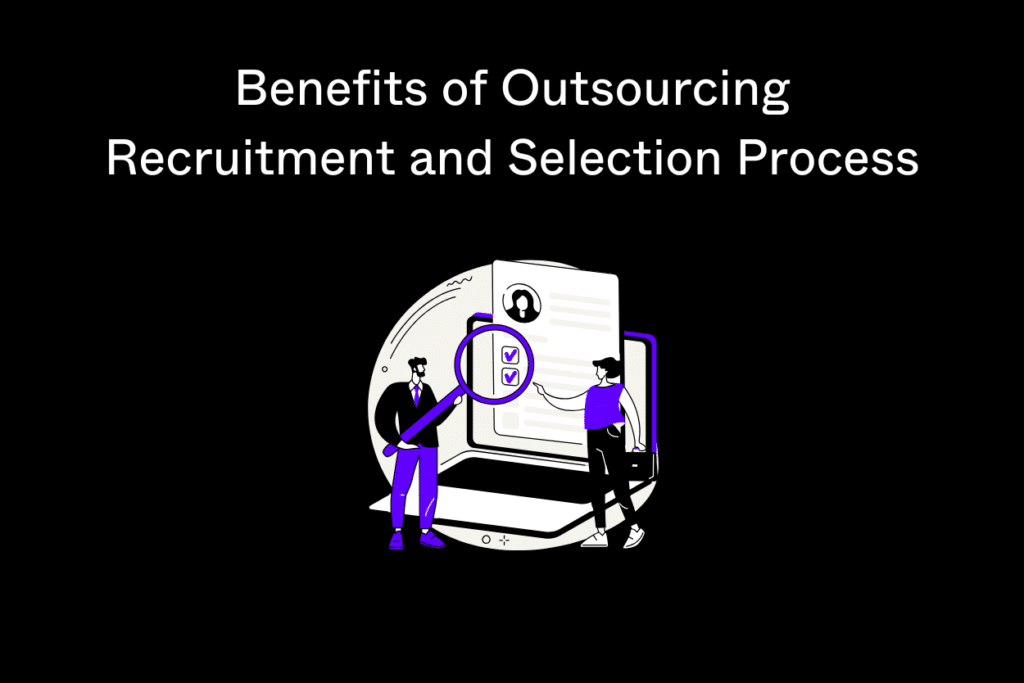
In an agile and expert-driven business environment, Recruitment Process Outsourcing (RPO) is a strategic talent acquisition solution. With the help of external recruitment specialists, organizations can improve their recruitment efficiency, concentrate on core business activities, and acquire top talent efficiently.
In 2022, the global market for recruitment process outsourcing was valued at USD 7.33 billion and is expected to expand at a compound annual growth rate (CAGR) of 16.1% from 2023 to 2030.
The Benefits of Outsourcing Recruitment and Selection Process blog explores the various advantages of outsourcing recruitment and selection processes and how it can revolutionize your company’s hiring strategy.
What is Outsourcing Recruitment and Selection Process?
Recruitment Process Outsourcing (RPO) is the act of hiring a third-party service provider to carry out all or some of the recruitment process of an organization. This association enables companies to use the services and resources of RPO providers to make their recruitment processes efficient from sourcing candidates to onboarding.
6 Benefits of Outsourcing Recruitment and Selection Process
1. Enhanced Quality of Hire:
RPO providers use advanced sourcing and screening techniques to ensure that only the most suitable candidates are presented to the organization, significantly improving the match quality of hires.
2. Cost Efficiency:
Due to outsourcing employment, businesses don’t have to invest a substantial amount of funds on advertising, along with recruitment charges paid out to headhunters.
3. Scalability:
RPO solutions provide scalability to increase or decrease recruitment activities according to fluctuating business requirements, which is especially useful for businesses with variable hiring needs.
4. Reduced Time-to-Hire:
RPO providers optimize recruitment processes to close openings quickly, thereby minimizing the downtime that vacant positions can lead to.
5. Access to Specialized Recruitment Expertise:
RPO companies usually possess industry or geographic expertise, offering access to networks and knowledge that may not be present internally.
6. Improved Candidate Experience:
With specialized resources dedicated to the recruitment process, candidates have a better communication and interaction experience, improving the employer brand.
Traditional Recruitment & Selection Vs. Outsourcing Recruitment & Selection Process
| Feature | Traditional Recruitment | Outsourcing Recruitment & Selection (RPO) |
| Scope of Service | Managed internally by the company’s HR team. | Managed by external specialists as part of an RPO firm. |
| Cost Efficiency | Often higher due to advertising, agency fees, etc. | Potentially lower with streamlined processes and economies of scale. |
| Expertise | Limited to the internal team’s experience. | Access to recruitment experts with specialized knowledge and industry insights. |
| Flexibility and Scalability | Limited by internal resources. | Highly scalable; can adjust to hiring needs dynamically. |
| Time-to-Hire | Can be lengthy due to limited resources. | Typically reduced due to streamlined processes and dedicated focus. |
| Quality of Hire | Varies based on the internal team’s capabilities. | Often improved through sophisticated sourcing and screening techniques. |
| Candidate Experience | Dependent on internal processes and workloads. | Typically enhanced due to dedicated resources focusing on candidate engagement. |
| Strategic Focus | HR teams divided between recruitment and other HR functions. | HR teams can focus on strategic HR functions while RPO handles recruitment. |
| Access to Innovation | Dependent on internal capabilities and technology adoption. | Access to latest recruitment technologies and practices. |
Is Outsourcing Recruiting Right For You?
Determining whether RPO is appropriate for your organization will hinge on a number of factors, most notably the size of your company, the amount of hiring, and the level of complexity for the positions you have to fill.
Companies that are experiencing high growth or operate in highly competitive talent market industries may benefit immensely from outsourcing their recruitment efforts.
Factors to Consider While Deciding on Outsourcing Recruitment Companies
When selecting an outsourcing recruitment company, it’s important to consider several key factors to ensure alignment with your business needs:
1. Industry Expertise
Choose a provider with deep knowledge of your industry to effectively attract suitable candidates.
2. Reputation and Reliability
Research the provider’s reputation through testimonials and reviews to gauge their reliability and success rates.
3. Technological Capabilities
Evaluate the provider’s incorporation of advanced recruitment technologies such as Applicant Tracking Systems (ATS) for streamlined process management.
4. Customization and Flexibility
Confirm that the provider can customize their services to suit your particular needs and accommodate shifting requirements.
5. Cost Structure
Clarify the cost structure and confirm it represents potential cost savings over legacy processes.
6. Cultural Fit
The provider must integrate with your company’s culture and values so that it can fit into your existing environment without any problems.
7. Communication and Reporting
Seek clarity in communication and updates on the recruitment metrics on a consistent basis.
8. Geographic Reach
If necessary, select a provider that can recruit in all the relevant geographies.
Cost and Return on Investment (ROI)
The fee to hire from an RPO provider depends on the scope and volume of services being offered. That said, as compared to hiring costs through more conventional means of recruitment, RPO has the potential to generate a better return on investment through shorter time-to-hire, higher hire quality, and reduced turnover rates.
Conclusion
Outsourcing recruitment and selection process is advantageous in many ways that can greatly increase the talent acquisition strategy of a company and its overall operational efficiency. Organizations can not only simplify their recruitment processes but also get a competitive advantage in the talent war by joining hands with the correct RPO provider.

